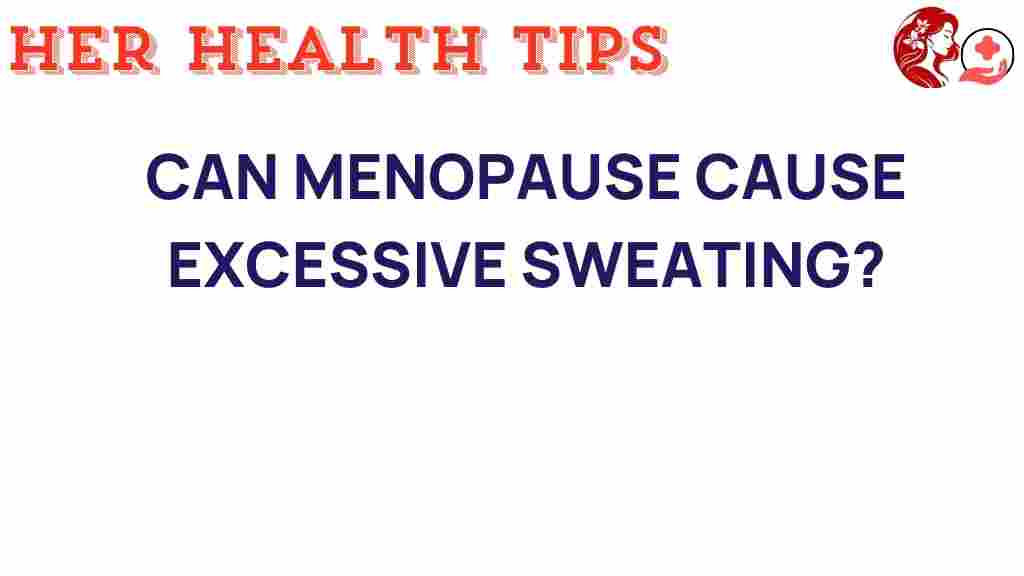Unraveling the Mystery: Can Menopause Trigger Excessive Sweating?
Menopause is a natural biological process that marks the end of a woman’s reproductive years. As women transition through menopause, they often encounter a variety of symptoms that can significantly impact their quality of life. Among these symptoms, excessive sweating, commonly referred to as night sweats and hot flashes, has raised many questions. This article aims to delve deep into the relationship between menopause and excessive sweating, exploring the hormonal changes involved and providing coping strategies for women experiencing these symptoms.
Understanding Menopause and Its Symptoms
Before we can fully understand how menopause triggers excessive sweating, it’s essential to grasp what menopause entails. Menopause typically occurs between the ages of 45 and 55, with the average age being around 51. It is characterized by the cessation of menstruation and a decline in reproductive hormone levels, particularly estrogen.
Some common symptoms of menopause include:
- Hot flashes
- Night sweats
- Irregular periods
- Mood swings
- Sleep disturbances
- Weight gain
- Vaginal dryness
Among these symptoms, hot flashes and night sweats are particularly bothersome for many women. These episodes can occur during the day or night and are often accompanied by a sudden feeling of warmth, excessive perspiration, and sometimes chills.
The Connection Between Menopause and Excessive Sweating
So, how exactly does menopause lead to excessive sweating? The answer lies primarily in the hormonal changes that occur during this phase. As estrogen levels fluctuate and eventually decline, they affect the body’s temperature regulation.
Hot flashes are one of the body’s responses to these hormonal changes. When estrogen levels drop, the hypothalamus (the part of the brain that regulates body temperature) may misinterpret normal body temperature as being too high. This causes the body to react as if it needs to cool down, leading to the sudden sensation of heat, sweating, and sometimes flushing.
Night sweats, a specific type of hot flash that occurs during sleep, can lead to disrupted sleep patterns and subsequent fatigue. These episodes can leave women feeling uncomfortable and anxious, further exacerbating the overall impact of menopause on women’s health.
Coping Strategies for Excessive Sweating During Menopause
While excessive sweating during menopause can be distressing, there are various coping strategies that women can adopt to manage their symptoms effectively. Here are some practical tips:
1. Lifestyle Adjustments
Making certain lifestyle changes can significantly help in managing excessive sweating:
- Dress in Layers: Wearing lightweight, breathable fabrics can help keep you cool. Layering allows you to remove clothing when you feel hot.
- Stay Hydrated: Drinking plenty of water can help regulate your body temperature and prevent overheating.
- Avoid Triggers: Identify and avoid foods or drinks that may trigger hot flashes, such as spicy foods, caffeine, and alcohol.
- Maintain a Healthy Weight: Excess weight can contribute to more severe symptoms, so a balanced diet and regular exercise are beneficial.
2. Stress Management
Stress can exacerbate hot flashes and night sweats, so incorporating stress management techniques into your routine can be helpful:
- Meditation and Deep Breathing: Practicing mindfulness and relaxation techniques can help reduce stress levels.
- Yoga: Engaging in yoga can promote relaxation and improve physical well-being.
- Regular Exercise: Physical activity is not only great for overall health but can also help manage menopausal symptoms.
3. Medical Treatments
If lifestyle adjustments are not sufficient, medical treatments may be considered:
- Hormone Replacement Therapy (HRT): This therapy involves taking estrogen or a combination of estrogen and progesterone to alleviate symptoms.
- Non-Hormonal Medications: Certain antidepressants and blood pressure medications can help reduce hot flashes.
- Alternative Therapies: Some women find relief through acupuncture, herbal supplements, or homeopathy.
It’s crucial to consult with a healthcare provider to explore the best options tailored to individual needs and medical history.
Identifying Symptoms and When to Seek Help
As women navigate menopause, it is essential to recognize the symptoms and understand when to seek help. While hot flashes and night sweats are common, other symptoms may require medical attention:
- Severe mood swings or depression
- Heavy bleeding or spotting
- Persistent pain during intercourse
- Unexplained weight loss
- Changes in memory or cognitive function
If any of these symptoms are present, it’s advisable to consult a healthcare professional for a thorough evaluation and appropriate management strategies.
Support Systems and Resources
Menopause can be a challenging time, but women don’t have to face it alone. Building a support system can be invaluable:
- Connecting with Peers: Joining support groups or forums can help share experiences and coping techniques.
- Seeking Professional Guidance: Healthcare providers can offer tailored advice and resources for managing symptoms.
- Educational Resources: Websites such as North American Menopause Society offer valuable information about menopause and women’s health.
Conclusion
In conclusion, menopause is a natural phase in a woman’s life that can trigger excessive sweating, including hot flashes and night sweats. These symptoms are primarily due to hormonal changes that occur during this transition. While the experience of menopause can be daunting, understanding the connection between hormonal changes and excessive sweating can empower women to take control of their symptoms.
By adopting effective coping strategies, making lifestyle adjustments, and seeking appropriate medical advice, women can navigate this phase of life more comfortably. Remember, menopause is a journey, not a destination, and with the right support and resources, it can be managed with grace and resilience.
This article is in the category Conditions and created by HerHealthTips Team
